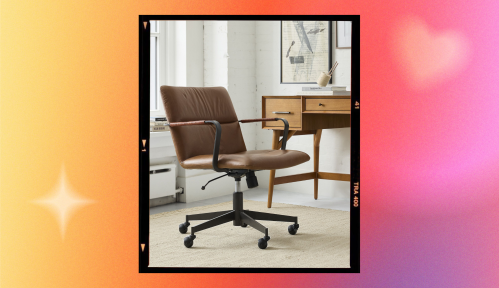Our editors independently select these products. Making a purchase through our links may earn Well+Good a commission
The Best Home Décor Picks To Make Your Home Look Like a Nancy Meyers Movie Set
A few home décor pieces can help you achieve the Nancy Meyers interior design aesthetic at home. Here are some ideas to get you started.
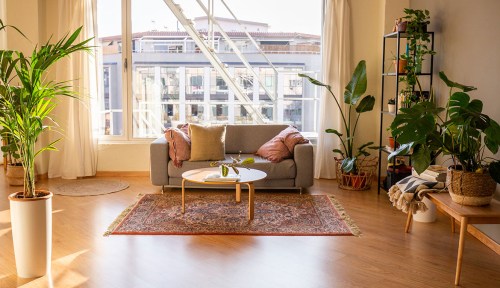
Two of the most pervasive interior design aesthetics on every feed are mid-century modern and Japandi (a portmanteau that illustrates the fusion of a minimalist, organic style rooted in Japanese and Scandinavian aesthetic sensibilities). Yet even as the coastal grandmother Pinterest boards are archived in favor of bloke-core, eclectic grandpa, and mob wife (in that order, loosely), the home décor equivalent of Diane Keaton-core remains prevalent. The signature Nancy Meyers interior has our hearts: taste that’s a touch coastal (no matter the movie set), perfectly lived-in, and forever timeless.
The homes featured in It’s Complicated and The Holiday come to mind immediately, though just as noteworthy (and proof of the iconic filmmaker’s signature interiors point of view) are The Parent Trap and Something’s Gotta Give. There’s a through line of Americana prep without sign of posh, and effortless curation sans fuss. Sophistication is undeniable (though never stiff; Meyers’s homes are meant for hosting!); bright whites are always warm from all the natural sunlight streaming in.
A dream house by the shore or a country cottage on the outskirts of a quaint little town helps, but a few home décor pieces (and perhaps a little elbow grease with a fresh coat of paint and rearranging your space) are all you need to achieve the look of a Nancy Meyers space in your own home.
The anatomy of the Nancy Meyers interior design aesthetic
Aside from Diane Keaton (the woman and every character she plays) personified in interior design form, these are the defining elements of a Nancy Meyers home you can interpret for your own space. (In fact, It’s not Complicated at all):
- Central space to gather—like a kitchen island or an inviting couch
- Ample, cotton upholstered seating for hosting, unexpected guests, and eye-opening conversation (skip the velvet and leathers)
- Maximum lighting flooding at all times, from open windows, candles, and matching lampshades or pendant lights
- Organic elements for contrast like linen, wood, jute, and terracotta pieces
- Mixed indoor/outdoor textiles to make the most of your pieces (and give them durability for all the entertaining possibilities)
- Fresh flowers
- Bowl(s) of fresh fruit
- Bright white or neutral walls
- Stacks of books (hardcovers, preferably)
- Framed black-and-white photos
- Oversized throw pillows
Best home décor finds to recreate the Nancy Meyers look for your space
Start with a few design elements or commit to the full Nancy Meyers aesthetic; it’s wholly up to you.
Paint
Paint is the most effective, albeit labor intensive, route when it comes to setting the right ambiance for your space. At first glance, a classic Nancy Meyers home is simply neutral—easy as they come—but there’s a tonal specificity required. Rooms in her world are crisp yet cozy, bright even when perfect movie-set sunshine isn’t flooding every corner. The key? Walls in soft whites or pale, oceanic hues (like muted blues, sandy taupes, and white sage) allow sun and candlelight to cast the whole room with a warm glow.
If Meyers’ more recent filmography is on your mood board, go for a pure white (natural light and warm bulbs by night will balance out the brightness). Warmer whites, though subtle in difference, work well with greenery and dark-wood-forward furniture (which looks great in living rooms); cooler greys and blues bring in subtle color (shades you’ll see in Meyers’ bedroom sets, for that calm and shore-chic).
Our recommendations
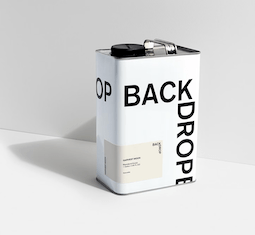
Backdrop, “Harvest Moon” $49
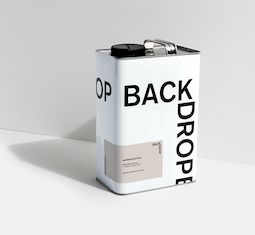
Backdrop, “Morning Ritual” $49

Backdrop, “Moonstone” $49
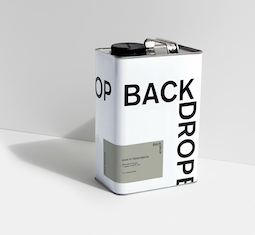
Backdrop “Road to Todos Santos” $49

Backdrop, “On Tour” $49
Lighting
Lighting also makes a tremendous difference—not just in the physical light cast (though bulbs matter; skip the glaring pure-white LEDs and think softer, warmer, and far cozier), but in how they add dimension to the room. A Noguchi-style paper lamp tells one story; a crystal chandelier tells another. In this playbook, transitional silhouettes anchor a room.
Take design cues from Nancy Meyers and think in pairs. Pendant lights and table lamps should come in matching sets; there’s room for unintentionally, curated clutter elsewhere. As for aesthetics, lighting should be rustic—though not fully farmhouse—or traditional. Open kitchen? Go for drop pendants with a cone shape (her signature, even in her own home). Living room? Set table lamps with classic linen bell or drum-shaped lampshades on accent tables that bookend the sofa. Working with a larger (or darker) living space? Add a floor lamp in the corner; the leg doesn’t have to match the others, but the shade shape should.
Our recommendations
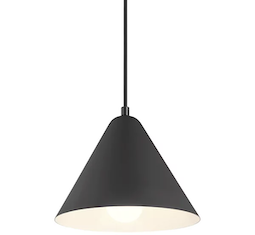
Access Lighting, Ford Pendant $78
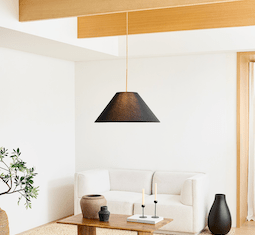
West Elm, Sculptural Fabric Cone Pendant $169
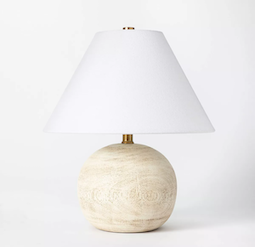
Threshold x Studio, McGee Medium Faux Wood Table Lamp Brown $45
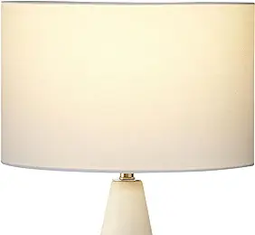
Brightech, Nathaniel Table Lamp $100
Textiles
Textiles are where Nancy Meyers’s cozy, lived-in aesthetic comes to life. Go seasonal or take literal inspiration from film, but no matter the direction you decide upon, choose at least one solid fabric as your foundation (like for your sofa: the largest, most-loved piece in a living room) before adding two to three textiles for a layered look throughout. You want thoughtful, not polished here—so experiment incorporating a mix of linens, outdoor-friendly fabrics for more of a beach-y grit, warm jute, and other woven fabrics from seating to floors.
Remember: the Meyers look is neutral but not minimalist, so use fabrications to inject a color (warm rust, soft sage, or pale blue for example) or play with print. Stripes are as preppy as they are nautical—a must for that coastal look—but a piece like a vintage beige kilim rug provides a grounding element if you prefer Meyers’ more modern sets.
A tip: if you have furniture you already love but want to refresh, slipcovers or seat cushions are a more economical way to get the look without having to start over. Don’t underestimate the transformative power of a throw blanket, swapping out your pillow covers, or softening your tablescape with a fabric runner.
Our recommendations
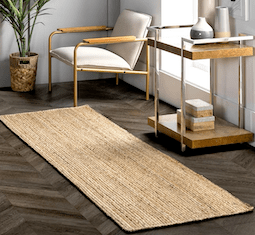
NuLoom, Jute Natural Indoor Runner Rug $72
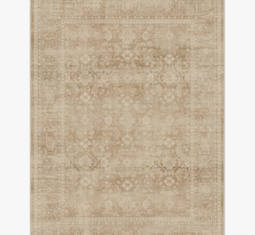
Ruggable, Ophelia Warm Natural Rug $399
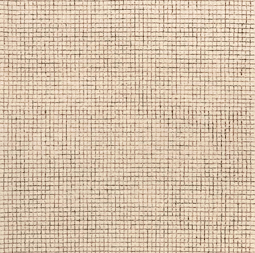
Rugs USA, Melrose Checked Cream Rug $144
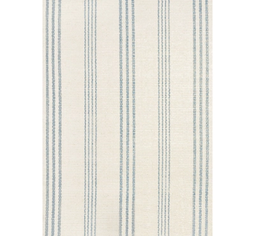
Annie Selke, Swedish Stripe Handwoven Cotton Rug $164
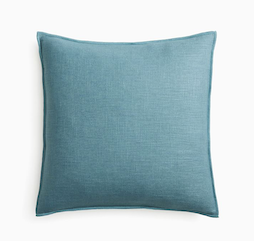
West Elm, Classic Linen Pillow Cover $34
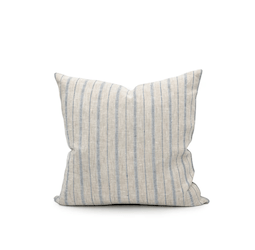
Krinto, Blue & Natural Grey Stripe Linen Pillow Cover $54
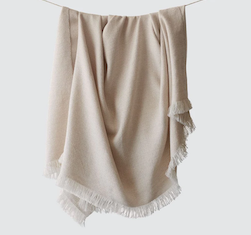
The Citizenry, La Calle Alpaca Throw $159
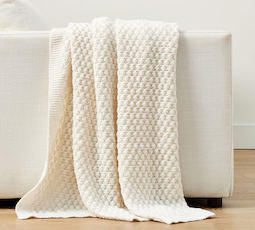
Pottery Barn, Bobble Knit Throw $48
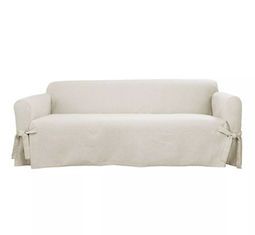
SureFit, Farmhouse Basketweave Oatmeal Sofa Slipcover $49
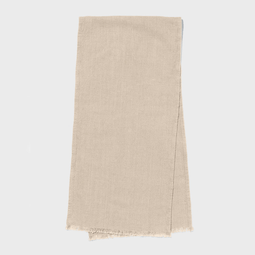
Public Goods, Khaki Table Runner $10
Home décor
Naturally, this is where personality comes in. The foundation of the Nancy Meyers home is rooted in traditional design (classic furniture silhouettes, timeless textiles, and an emphasis on natural woods—nothing too cool, over-dyed, or treated with a wash). Where it gets transitional, and inherits that signature loved-and-lived-in look, lies in the décor.
Fresh flowers and greenery are a must; your local flower shop can do the arranging for you (and Trader Joe’s is always reliable: affordable, seasonal, and easy to DIY). Giant bowls of fruit, too, are essential. (Think less Dakota Johnson’s limes in Architectural Digest and more so farmer’s market produce; everything is freshly washed but meant to be eaten.) Those two elements add brightness and color; everything else should be neutral.
Stacks of books, however, are the cornerstone of any Nancy Meyers room. Collect them throughout your travels or if you’re keen on filling a shelf or coffee table, vintage booksellers on Etsy curate entire stacks by cover color, aesthetic, and topic. Pepper in imperfect ceramics and terracotta vessels for height and texture, add height with the aforementioned florals, and you’re nearly there. (Olive Atelier sources one-of-a-kind pieces at some of the most competitive prices on the market, but if you’re in L.A. or miss their elusive online, similar styles can be found; we hand-selected a few favorite finds below.)
Minimalist black frames balance out these more rustic touches. (In older Nancy Meyers films, you’ll see slightly more ornate brass or silver frames; newer movies feature more modern gallery moments.) Do display your kitchenware proudly, too—especially if you’re working with an open-floor plan. Most Meyers-manifested kitchens feature walls of hanging pots and pans that serve two purposes: the cool metal contrasts the softer, natural design elements beautifully, and there’s nothing like the thought of home-cooking, implied or real.
Our recommendations

ReVamp Books, Stack of Curated Books $49

Flamingo Estate, Fridays From the Garden Cookbook $78

Barefoot Contessa Cookbook Collection $100
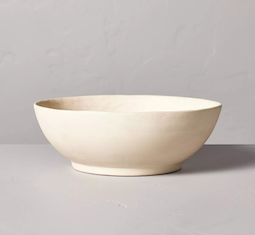
Hearth & Hand x Magnolia Artisana, Handcrafted Decorative Bowl $25
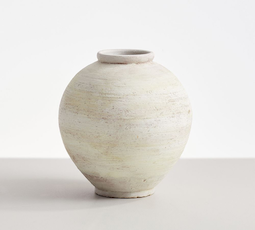
Pottery Barn, Artisan Handcrafted Terracotta Vase $49
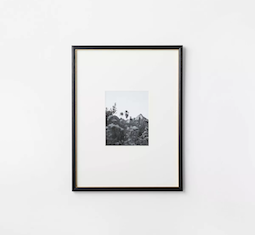
Threshold x Studio McGee, Black Gallery Wall Frame $50
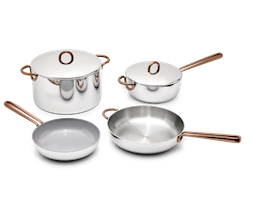
Great Jones, Precious Metals Cookware Set $395
Final touches
The devil’s in the details. For ambiance, light a candle that scents the space depending on the occasion: D.S. & Durga Breakfast Leipzig ($70) smells like that scene when Meryl Streep and Steve Martin make a mess baking buttery chocolate croissants; Nette Georgica ($68) is the early morning or midday sea breeze as white towels dry in the sun; D.S. & Durga Pasta Water ($70) is to be lit just before dinner (even if you’re just ordering in Italian). Bookending your days with food-inspired scents is pivotal to achieving the screen-to-IRL mood Meyers’s movies instill in us: some of her most heartwarming scenes are inspired by Ina Garten, proof that a meal is comfort and comfort, food.
Then there’s the mood lighting. Once the sun goes down and shutters are closed, light a few at the table (dinner or coffee, wherever you and yours gather). Off-white pillar candles pay homage to The Parent Trap and Meyers’s older filmography, whereas tapered candles work well with more modern interpretations of the aesthetic.
And for that true, lived-in look, live in your space. A striped beige bathrobe and matching slippers? Very Diane Keaton.
Our recommendations

D.S. & Durga, Breakfast Leipzig Candle $70

D.S. & Durga, Pasta Water Candle $70
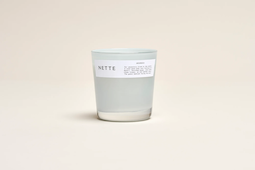
Nette, Georgica Candle $68
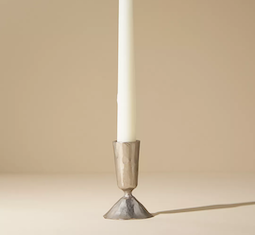
Anthropologie, Elizabeth Taper Candlestick $16
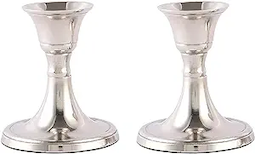
Rely + Smart, Silver Candlestick Holders $12

Burke Décor, Metal Taper Holder $11
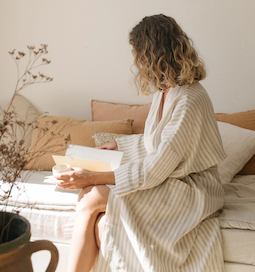
AprilNotesShop, Handmade Beige Stripe Linen Bathrobe $115
Sign up for the Well+Good SHOP Newsletter
Get exclusive deals on wellness, beauty, fitness, and food products that have been hand-picked by our editors.
Got it, you've been added to our email list.



